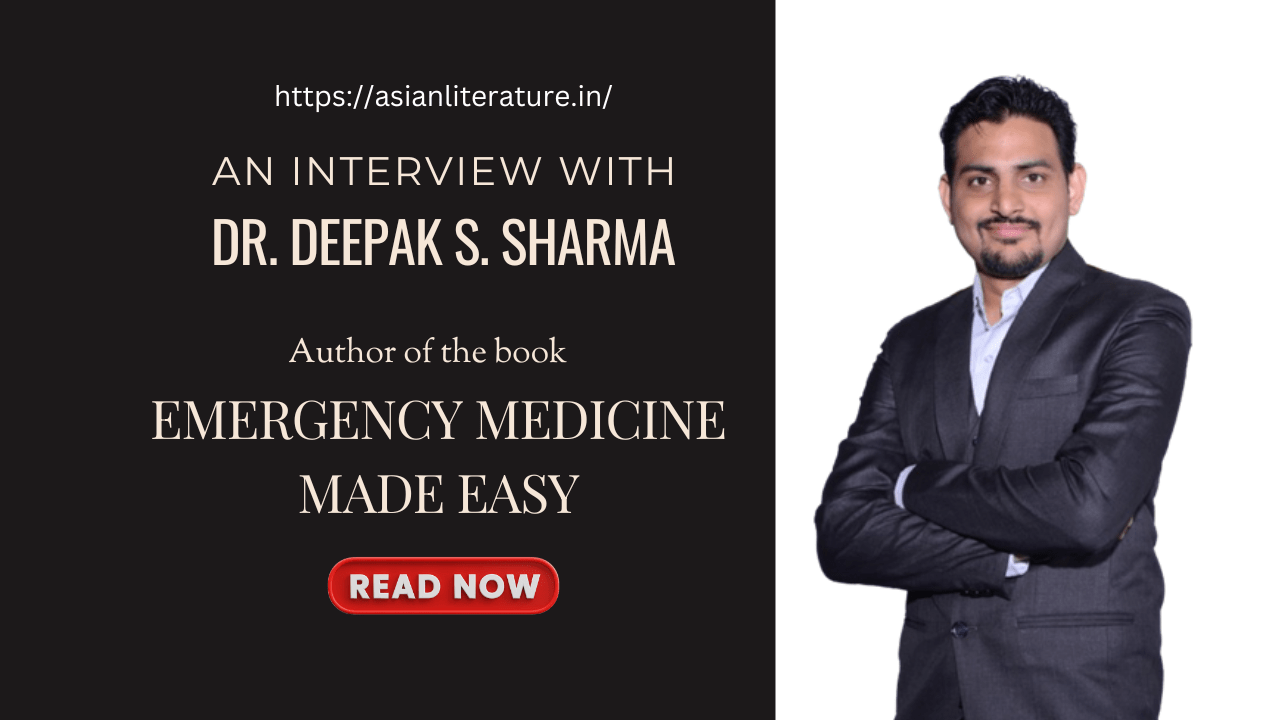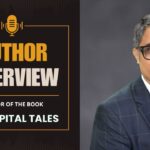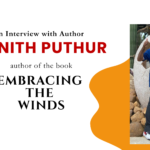
Dr. Deepak Sharma
Introduction
Dr. Deepak S. Sharma, MBBS, DA, IDCCM, EDIC, AFICM, MRCEM (UK), FCCS is a Critical Care Medicine Consultant working in UK currently. He has a background of specialisation in Anaesthesiology and an interest in acute and emergency care and more than a decade of experience in field of medicine. He has developed his Critical Care and Emergency Medicine skills in Ahmedabad. He is a current EDIC (European Diploma in Intensive Care) Examiner. He also is devoted educator, being an Instructor for courses like ATLS, EPALS, BLS, ACLS, FCCS, USLS BL1 & Nursing Critical Care projects. He is a keen writer and has published in national and international journals of intensive care medicine. He is a passionate learner of POCUS/FUSIC in Intensive care & Emergency Medicine where he wants to broaden his horizon.
Interview
The Asian Literature: Welcome to The Asian Literature, author. Congratulations on the release of your book. What responses are you getting from your readers? Please share your experience with this book.
Dr. Deepak Sharma: Thank you for the warm welcome and for featuring me. The response from readers has been overwhelmingly positive. Many have expressed that the book Emergency Medicine Made Easy simplifies complex concepts in this subject, which is exactly what we aimed for. It’s been heartening to hear from both seasoned professionals and medical students alike, who appreciate the practical approach and clarity. It’s rewarding to know that the book is making a difference, particularly in a field as high-stakes and fast-paced as emergency medicine.
The Asian Literature: What encourages you to become an Author?
Dr. Deepak Sharma: As a clinician, I have always found immense satisfaction in teaching and sharing knowledge. Writing allows me to reach a broader audience than I could through clinical work in EM alone. The idea that my experience and insights could be of value to someone, possibly helping them navigate the complexities of Emergency Medicine, inspired me to write this book. It’s about leaving a lasting impact and creating a resource that others can refer to in critical moments. And also, Krishan Rajbhar has been instrumental in encouraging me to author this book.
The Asian Literature: What are your favorite topics of writing? Please tell us something about your interest areas in the literature.
Dr. Deepak Sharma: My primary focus is on simplifying complex medical topics—whether it’s Emergency Medicine, Anaesthesia, or Intensive Care Medicine. I enjoy breaking down intricate medical concepts into easily digestible information. Beyond that, I have a keen interest in medical education and the psychological aspects of decision-making in high-pressure environments, which I hope to explore more in future writing projects. My goal is always to blend clinical insight with practical application.
The Asian Literature: We were hoping you could tell us about some of those writers who had inspired you and whom you follow!
Dr. Deepak Sharma: Some of my greatest influences have been clinical authors who manage to combine academic rigor with readability. Atul Gawande, for instance, has always been an inspiration. His ability to humanize medicine while tackling difficult ethical and procedural issues resonates deeply with me. He reminds me that the best writing, even on technical subjects, can be both informative and engaging.
The Asian Literature: The titles seem different and catchy; how you decided it? Please let us know the story behind it.
Dr. Deepak Sharma: The title, Emergency Medicine Made Easy, was born out of the desire to offer a clear and concise resource to those working in stressful, time-sensitive environments. It was suggested by Krishan Rajbhar who holds a series of books with the similar intent. The goal was to create something that sounds approachable and promises clarity—because in emergency medicine, every second counts, and simplicity can save lives. We wanted the title to immediately communicate that the book is user-friendly, practical, and designed for rapid comprehension.
The Asian Literature: What are your achievements so far? Tell us something about your writing career.
Dr. Deepak Sharma: My career as an author has just begun, but I’ve been fortunate to already receive strong feedback for Emergency Medicine Made Easy. My background in Critical Care Medicine, Anesthesiology and Emergency Medicine has allowed me to contribute to several academic papers and clinical guidelines over the years, which laid the foundation for this book. The book itself is a collaborative effort, and I consider the positive reception from peers and students as a significant achievement. It’s gratifying to know that what started as a personal passion project is now being used as a trusted resource by others.
The Asian Literature: What is your current goal in writing a career? How do you see your future in writing?
Dr. Deepak Sharma: My immediate goal is to continue bridging the gap between clinical knowledge and accessibility. I hope to expand into writing about Intensive Care Medicine in a similarly concise manner. The future is bright, and I see writing as an integral part of my career—continuing to contribute to medical education and potentially authoring more books that simplify the topics.
The Asian Literature: Are there any other books being worked by you? Please let us know about your future projects.
Dr. Deepak Sharma: Yes, there are a few projects in the pipeline. I am currently working on a book focused on Intensive Care Medicine, which aims to simplify the core principles and bring them to the same accessible format as Emergency Medicine Made Easy. It is in the early stages but progressing well.
The Asian Literature: How you see Indian writing in the 21st century? What changes do you see in the modern way of writing? Do you feel it has been changed by the time?
Dr. Deepak Sharma: Indian writing has evolved tremendously in the 21st century, especially with the advent of digital platforms. There’s a greater emphasis on accessibility and relatability, even in academic writing. Medical literature in India is no exception—there’s more focus now on practical application and real-world scenarios, which is essential in fields like Medicine. I believe modern writing has shifted to become more inclusive, reaching a wider audience without sacrificing depth. This balance of knowledge and engagement is a positive change, reflecting the growing demand for literature that educates and informs while being easy to comprehend.
The Asian Literature: How easy/ difficult it was for you to publish your book? What message would you like to give to budding authors?
Dr. Deepak Sharma: The process of publishing Emergency Medicine Made Easy was both challenging and rewarding. While writing it came naturally to me, the journey of editing, refining, and ensuring the content was accurate yet accessible took time. Publishing in the medical field also comes with its own set of challenges—there’s a need for precision and peer review. My advice to budding authors is to stay patient and be persistent. Writing is an iterative process, and it’s important to keep refining your work. Most importantly, write with purpose. If your writing aims to add value, whether to a niche audience or a broad one, it will resonate.
Book: Emergency Medicine Made Easy
Publisher: Evincepub Publishing

